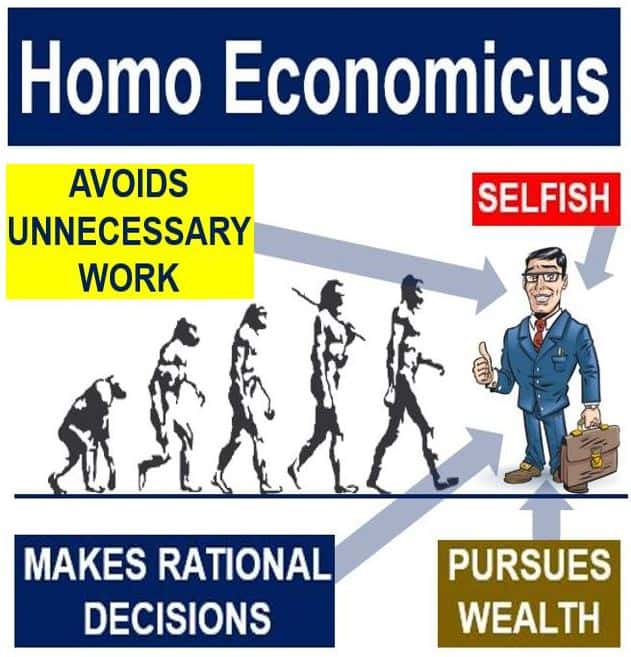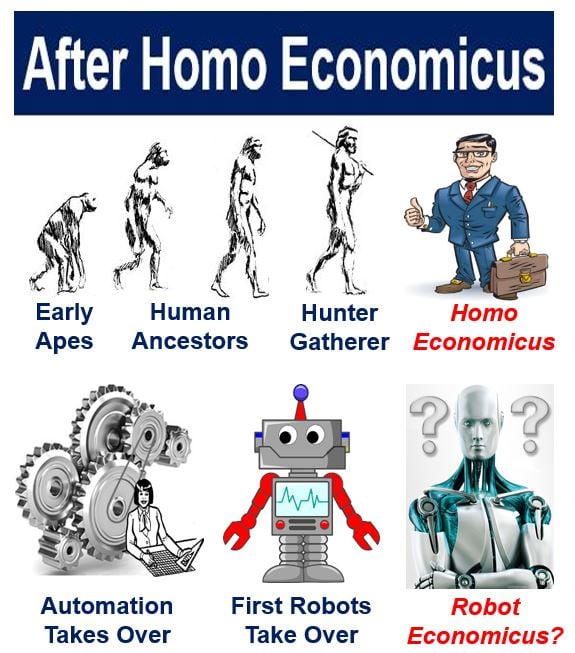Homo economicus is Latin for Economic Man. In Economics, we use the Latin or English term when describing human beings as rational and self-interested entities that are capable of making judgments towards subjectively-defined ends, such as the accumulation of money, wealth and resources, and avoid unnecessary work.
It is used as a basis for most economic models, where it is assumed that we all act like homo economicus.
Economists who use homo economicus in their business models say that generally, humans attempt to maximize utility as consumers and profit as producers or suppliers.
 Is this human evolution in the world of economics? From swinging in the trees looking for fruit, walking erect as hunter gatherers, to farmers, and finally selfish, rational decision makers who pursue wealth and avoid unnecessary work? That is the definition of homo economicus.
Is this human evolution in the world of economics? From swinging in the trees looking for fruit, walking erect as hunter gatherers, to farmers, and finally selfish, rational decision makers who pursue wealth and avoid unnecessary work? That is the definition of homo economicus.
In game theory, homo economicus is frequently modeled through the assumption of total rationality.
The Free Dictionary defines homo economicus as:
“A person that desires to maximize his/her needs or desires. Homo economicus is used most of the time to refer to the rational economic actor, who desires wealth, does not desire to work if it can be avoided, and is able to find ways achieve those ends.”
Are homo economicus assumptions accurate?
Some economists suggest that this assumption regarding human behavior might be inaccurate, and have proposed alternatives.
Traditional Classical and Neo-Classical economists believed that humans acted in their own self-interest.
Scottish moral philosopher and political economist Adam Smith (1723-1790), known as the ‘father of modern economics’, argued that society became generally wealthier if everybody pursued their selfish interests, as this would drive what he called the ‘invisible hand’.
 It took nearly two million years for us to evolve from ancient apes to the modern, selfish homo economicus. What will come next? Automation and smart robots will gradually take over most jobs currently done by humans. If artificial intelligence (AI) develops IQs far beyond ours, will homo sapiens become extinct? Will future AI economists have ‘robot economicus’ in their models?
It took nearly two million years for us to evolve from ancient apes to the modern, selfish homo economicus. What will come next? Automation and smart robots will gradually take over most jobs currently done by humans. If artificial intelligence (AI) develops IQs far beyond ours, will homo sapiens become extinct? Will future AI economists have ‘robot economicus’ in their models?
Over the past few decades, mainstream economists have attempted to include a broader range of features for human motivations in their models.
“In recent years, mainstream economists have tried to include a broader range of human motivations in their models. There have been attempts to model altruism and charity. Behavioral economics has drawn on psychological insights into human behavior to explain economic phenomena.”
A study carried out by researchers from Hitotsubashi University, Tamagawa University, and Aoyama Gakuin University, all in Japan, found that homo economicus made up just a small minority of a sample population of well-to-do people.
After gathering and analyzing data on 446 residents of relatively wealthy Tokyo suburbs, only 31 met the behavioral definition of homo economicus.
Regarding those thirty-one individuals with homo economicus-like features, the authors wrote:
“We see a person who is intelligent, driven to excel and to dominate other people, and capable of impulse control and of working toward long-term goals. In other words, Homo economicus is the prototypical member of the social and economic elite.”
After analyzing the Japanese study, Peter Ubel wrote in a Forbes article:
“The neoclassical economic view of human nature was always a caricature. Now we have a better sense not only of how poorly that view characterizes most humans, but also of how poorly behaved the people are who act according to this caricature.”
Origin of homo economicus in English language
As a term it was first used by John Stuart Mill (1806-1873), an English political economist, philosopher and civil servant, in one of his works on political economy.
Mill, one of the most influential thinkers in the history of liberalism, wrote:
“[Political economy] does not treat the whole of man’s nature as modified by the social state, nor of the whole conduct of man in society. It is concerned with him solely as a being who desires to possess wealth, and who is capable of judging the comparative efficacy of means for obtaining that end.”
In the same work, further on, he went on to write that he was proposing “an arbitrary definition of man, as a being who inevitably does that by which he may obtain the greatest amount of necessaries, conveniences, and luxuries, with the smallest quantity of labor and physical self-denial with which they can be obtained.”
Even though homo economicus did not emerge properly in the English language until the 19th century, it is frequently associated – some say incorrectly – with the notions put forward by 18th century thinkers, including David Ricardo and Adam Smith.
The following comment came from Smith’s The Wealth of Nations (a magnus opus published in 1776):
” It is not from the benevolence of the butcher, the brewer, or the baker that we expect our dinner, but from their regard to their own interest.”
In other words, we get meat from the butcher, bread from the baker, and beer from the brewer not because they are compassionate people who care about our nutritional well-being, but because they are selfish and want to make money.
However, Smith and Ricardo were aware that human beings had a range of other motivations from altruism to spite to self-interest, and they took those into account.
Homo economicus notion ridiculous, many say
If we look at our own behavior and those of family members, friends and work colleagues, in the majority of cases we find totally illogical consumer behavior.
How many times have you gone out, bought for example too many donuts, only eaten some of them, and thrown the rest away?
Due to that greedy consumption, too much money was spent and the consumer made himself or herself feel sick. That kind of behavior is neither self-serving nor rational – and is most definitely not a feature attributed to homo economicus.
A huge proportion of consumers spend money on things they do not require, drink too much at prices they are unable to afford, and make charitable donations without expecting anything in return.
Huffington Post editor and writer made the following comment in an article:
“The conception of homo economicus vastly underestimates the greater qualities of the individual: kindness, generosity, solidarity, waywardness, stupidity and drunkenness. The great mass of individuals, I’m afraid, are neither self-serving nor even remotely rational.”
“Homo economicus is one of those economic ideas that endeavours to explain everything. It adopts a very rudimentary philosophical argument regarding human nature and attempts to justify political and economic systems based on that argument.”
Video – The Death of Homo Economicus
In this New Economic Thinking video, Sam Bowles, Professor Emeritus at the University of Massachusetts Amherst, notes that humans are complex, psychological beings given to a wide range of motivations well beyond naked self-interest.
